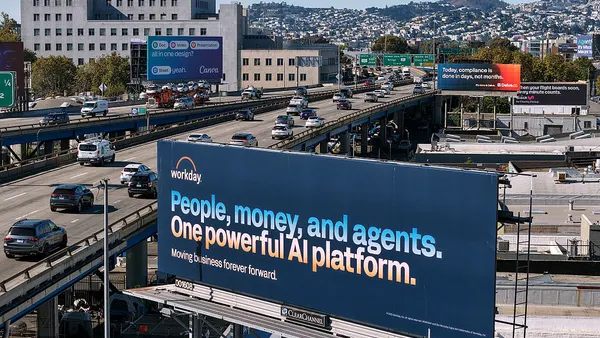Dive Brief:
- Forty-three percent of workers said there are “little to no growth opportunities” at their current job in a SurveyMonkey survey of more than 3,500 full-time employees conducted in late July and early August.
- Generation Z led in dissatisfaction, with only 28% saying they were satisfied and content with their current situation. Thirty-eight percent of millennials and 47% of Gen X workers agreed. Gen Z was also most likely to jump ship for another company, SurveyMonkey found.
- More broadly, survey results showed workers are financially stressed, with 3 in 4 engaged in or considering side hustles, and two-thirds saying money is a main driver for career choice. The results also report hustle culture is back in other ways, with more than half saying long hours and being “always on” is pervasive at their company.
Dive Insight:
After several years of an employee-friendly economy, the pivot back to an employer’s market may feel like whiplash for many workers. Anxiety is up, and employees are fumbling for security in a time of widespread layoffs and shrinking opportunity.
Benefits and salary budgets generally have stagnated, and employers have seemingly pared back learning and development as well. Respondents to HR Dive’s Identity of HR survey said training had dropped in importance at their organization, with only 5% saying it was a top priority this year, compared to 12% last year. As a result, recruiters have been looking for highly qualified candidates to fill certain roles, while some say overlooked talent can’t access the learning opportunities that might help them rise into those positions — creating a catch-22.
AI skills have commanded much of the conversation around training, and reports have shown that few employers are investing in learning programs on the topic. A July report from BambooHR found roughly one-third of employers have offered such training, and a May report from Amazon Web Services showed many employers don’t even know what such training would look like.
Between the need for skilled workers and employee demand for training, some HR professionals have shifted from a recruiting focus to one of retention and development; those eyeing a similar path may need to agitate for a bigger L&D budget next year. Concerned about the encroachment of AI on entry-level opportunities, Gen Z has shown it will particularly prioritize employers who can offer skill-building and continuous learning opportunities, with more than half of Gen Z workers telling Flexa as much.
















